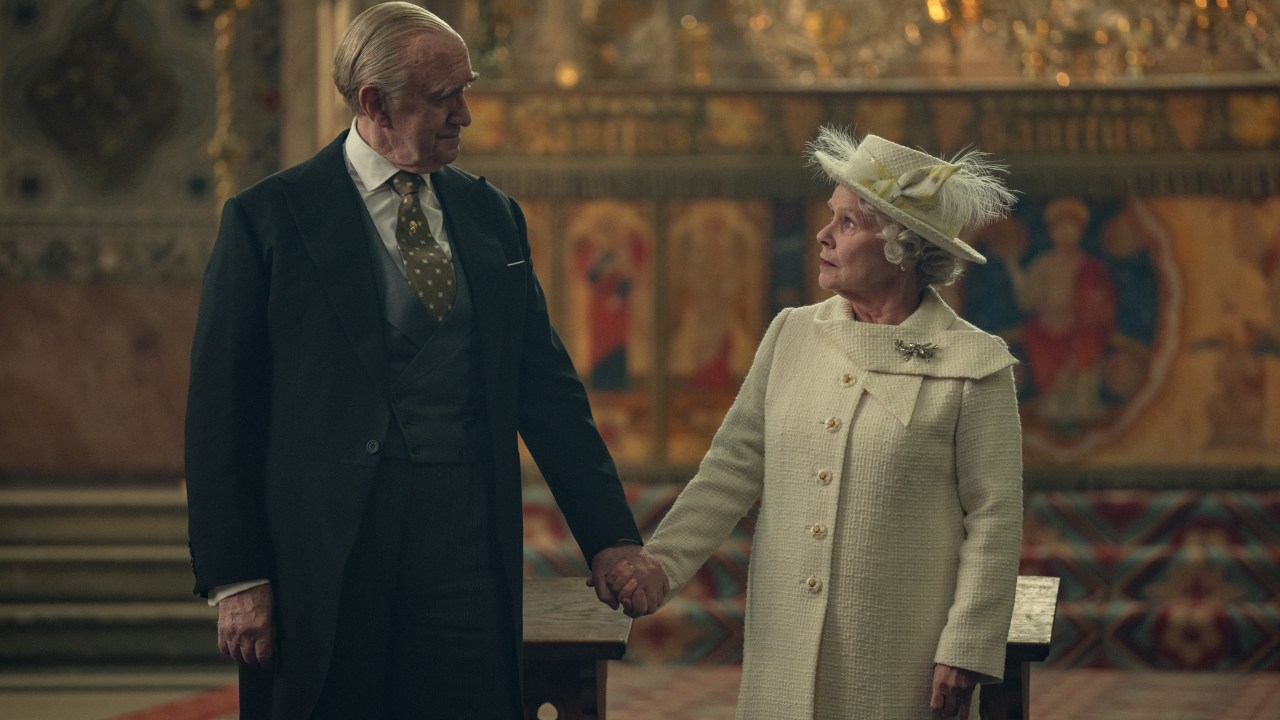Jonathan Pryce was more than ready to portray Prince Philip when the call came five years ago for him to embody Queen Elizabeth’s consort in the Netflix drama hit The Crown.
“He’s someone I’ve lived with all my life,” he says.
From a distance, of course.
“He’s been part of my life, part of all our lives, since 1953, when I watched the Queen’s Coronation aged six,” he says. His family, in Carmel in Flintshire, North Wales, was one of the first on their street to have a television set.
Those memories were summoned once the call came, seven decades later, to play the man, who in public at least, was always seen walking behind his sovereign; hands clasped in the small of his back, his anointed spouse’s “strength and stay.”
Once Pryce burrowed into the whopping reams of background “the size of a book,” given him by The Crown’s “enormous research department”, he realized that the Duke of Edinburgh, the title conferred upon him when they wed in 1947, “wasn’t this dour person” marching dutifully in his wife’s shadow. “He’s a very vibrant, funny, intelligent man,” says Pryce.

“It was great to discover all the things l didn’t know about Philip,” he says, citing the exacting patriarch’s relationships outside of the royal family — his polo-playing friends, his joy of life, his intellect. “It’s very educative learning about him and enormous fun playing him.”
Looking back at the final two seasons of the show, penned by Peter Morgan, in which Pryce appears, he admits to there having been a “little twinkle”, at times, in the duke’s eye when he played him, especially in scenes where he’s with his grandsons William and Harry, played (as older teenagers) by Ed McVey and Luther Ford.
Philip, it’s widely known and acknowledged, had “difficulties” with Prince Charles, now King Charles, when the monarch was a lad. Philip was accused of being cold and aloof toward his eldest son, although it’s often been argued that he was toughening the princeling up for what was to come.
However, Pryce reports that playing opposite Dominic West’s Charles was simply delicious. “It was a lot of fun being horrible to Charles, and Dominic West used to cry, ‘This is terrible! Why are you being so horrible to me?’ And I loved it,” he laughs.
But he rather would have liked to turn the heat up a few more degrees opposite West with “more of Philip’s acerbic wit.” Historically, Philip was known for his long list of shocking verbal gaffes. “I think we could have got a few more gaffes in there. That would have livened it up a bit,” Pryce says.
Because Pryce was playing Philip as an “older and wiser man” who was “slowing down a bit,” he had time for his grandchildren.
“I think you see elements of yourself in your children,” says Pryce, who has three grownup children with stage and screen artist Kate Fahy, his partner since 1972 — they married in 2015. “And I think he saw elements of himself in his grandchildren.” This served as a contrast to Phillip’s younger image as a bit of a bad-boy playboy before he married Elizabeth.
He observes that William, too, had difficulties with his own father, similar to the ones between Philip and Charles. He also notes Philip’s own lack of a father when he was younger.
“I think he wanted to make it right for William,” he says.
Pryce mentions a scene where Philip goes to visit William at school at Eaton and plays chess with him “and tries to guide him”. The great thespian grows wistful for a moment. “There’s not a lot of acting required when you’re a 76-year-old actor in the twilight of your career, talking to an actor in virtually his first job, and the advice you’re giving his character, the sounds of it, mirrors the advice you’re giving to a young actor.”

Similarly, when Pryce plays David Cartwright, the patrician, one-time all-powerful British intelligence service chief in the Apple TV+ series Slow Horses, he tries to teach his James Bond wannabe grandson River Cartwright, played by Jack Lowden, the ropes.
“I give good grandfather, is what I do these days,” he chuckles.
Grandfatherly or not, his career isn’t remotely slowing. He’s just received two Emmy Award nominations, in fact. One in the Supporting Actor category for his Prince Philip in The Crown, and the other for his guest role as Cartwright in Slow Horses.
So, when I gently tackle Pryce for his earlier “twilight” of his career comment, he agrees that “twilight is not the right word.”
He says: “No, I might’ve said it to you years ago that my ambition was to retire at 60 [he did indeed say that] because I didn’t want to be the old man, who’s the old actor, who’s patronized by the young actors and the crew. And once I feel that, any sense of being patronized, then I will stop. But at the moment, no, I’m having a great time. And I mean, you hear people my age saying there’s a great freedom to being older. Yes. I’m still as ambitious as ever, and I’m as ambitious to get things right as ever.”
However, he confesses to having mellowed somewhat over the years. “I’m a lot more relaxed about it now. I get upset less, I get angry less, which my family will be very happy to hear.”
But Politics can absolutely still rile Pryce. “Try being angry for 14 years,” he says, referring to the period for which the U.K. Conservative Party was in government, that is until its recent ousting by Keir Starmer’s Labour Party in the general election. That result made him “very happy”, he says.
His eyes shine too, when our discussion turns to playwright Trevor Griffiths’ play Comedians, the first major piece of work he did upon graduating from the Royal Academy of Dramatic Art.
To put it into perspective: Pryce was part of the ’70s wave of RADA graduates that included Alan Rickman and Juliet Stevenson; the previous ’50s and ’60s new wave had included the likes of Albert Finney, Tom Courtenay, Glenda Jackson, John Hurt, Michael Williams and Anthony Hopkins.
It took a lot to measure up to such titans of the stage and screen.

Richard Eyre, then artistic director of the Nottingham Playhouse, cast Pryce as Gethin Price, one of a bunch of stand-ups waiting to do their “turns” at a local pub.
Price’s act explodes like a bomb let off on stage when he clashes with the established order by declaring that the political reality in his act is not funny, but truthful.
The show transferred down to the Old Vic and then to Broadway, where Mike Nichols directed it in 1977; Milo O’Shea, John Lithgow, Armand Assante and Larry Lamb were also in the New York company.
When the play was about to open at the Music Box Theatre, Pryce received a telegram saying that his father, who ran a corner shop back home in Wales, had been attacked with a hammer. But Pryce was unable to return home. Then, another telegram arrived informing him that his father had died of his injuries.
Two years later, Pryce channeled his grief into a production of Hamlet, directed by his friend Eyre. It was a Hamlet for the ages.
The one-two punch of Comedians and Hamlet catapulted his career. He was courted for movies and even bigger roles on stage.
He teamed up with Eyre again, this time to star in the movie The Ploughman’s Lunch, which was soon followed by Terry Gilliam’s Brazil, followed by The Adventures of Baron Munchausen, The Age of Innocence, Jumpin’ Jack Flash, Evita, Tomorrow Never Dies and a host of others. On stage he continued to dazzle, never more so than in Miss Saigon, directed by Nicholas Hytner at the Theatre Royal Drury Lane and produced by Cameron Mackintosh.
All the while, he kept in mind something the legendary acting teacher Lee Strasberg had shared with him. Pryce met Strasberg at one of his open classes and then had lunch with him, his wife Anna and Al Pacino at New York’s Joe Allen restaurant. Another time, Pryce went to Strasberg’s office and had a sandwich lunch.

“And I’m in the office, and I’m thinking, I don’t really know what to say to him, but I’m with Lee Strasberg, for god’s sake, I better ask him a question,” Pryce recalls.
The actor tells the famous acting teacher that it’s his first time on Broadway, first time doing anything for any length of time, eight times a week for months, did he have any advice on how to keep creating the role? “And there was a silence. And he said, ‘You do it.’ And he bit his sandwich, and he chewed and he chewed. He looked up and he said, ‘It’s your job.’ That was it,” Pryce says.
“That’s the best bit of advice he could ever have given me… There you go. That’s it,” he says.
He has tickets to see his TV wife Imelda Staunton, who portrayed Queen Elizabeth in The Crown, in Hello, Dolly! at the London Palladium, where she has won rapturous raves from the critics for her portrayal of Dolly Levi. “Yeah, she’s incredible, I’m looking forward to seeing her,” he says.
Pryce respects how Staunton dives into her work, but they still have time for laughs away from the rehearsal room or sound stage.
“We have fun chats away from a set or if we have dinner or drinks on location, but she is very focused on set. I have a different approach. I’m a bit looser,” he says, although he notes that because they’ve known each other such a long time it’s much easier for them to prepare to do a scene.
He’s had good experiences as well on Slow Horses, the fourth season of which will begin streaming on Apple TV+ in September.
There’s enjoyment he says in playing a character “who is known to have a secret, it is fun. I know that at some point they’re all going to be after him for his secrets.”
The fear is that Cartwright has developed dementia and “he’s got his head full of top-secret knowledge, and that he could just blurt anything out at any time. And that’s interesting to watch,” he says.
He and Eileen Atkins appeared in Christopher Hampton’s adaptation of Florian Zeller’s 2018 play The Height of the Storm, and it too touched upon dementia. Pryce has been an ambassador of the Alzheimer’s Society since then and says he feels “a double responsibility to get it right and not to abuse it in any way.”

He has also recently been shooting, among several other projects, The Thursday Murder Club movie directed by Chris Columbus for Netflix and Amblin. It’s based on Richard Osman’s bestseller about a group of septuagenarians in an assisted living facility who solve murder cases. He plays the husband of Helen Mirren, whose character, a former spy, is central to the story.
Pryce also reveals that “there’s a little bit of dancing” involved in The Thursday Murder Club. At some point, he had sent Columbus a link of him performing the show-stopping “The American Dream” dance number in Miss Saigon. “I said to Chris, ‘I can dance. Why don’t we do something, Helen and I?’ Because I thought it was important to show that they enjoy life as they would’ve done when they were in their 20s or 30s. So, it was a bit of jiving.”
He and Mirren dance to a Cat Stevens number, which he’s thrilled about, because since 1972, he and his wife Kate have loved Cat Stevens, “and Joan Armatrading, too”, he says. Then he moves a little to an imaginary beat. Perhaps he’s thinking of this most recent dance, or of the many others he’s yet to enjoy. Either way, there’s nothing “twilight” about it.

